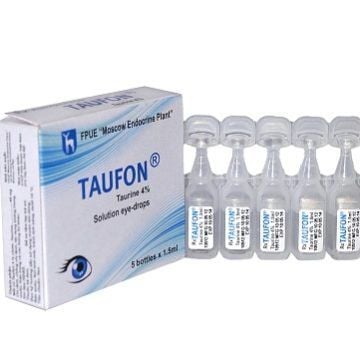This is an automatically translated article.
Taurine is an amino acid found in many foods and is often added to energy drinks. Many people consider Taurine as a dietary supplement and some researchers call it the “miracle molecule”.
Taurine has been shown to offer a number of health benefits, such as reducing disease risk and improving athletic performance. It is also very safe and has no side effects when taken in reasonable doses.
1. Definition of Taurine
Taurine is not extracted from bull urine or bull semen for which the name is derived from Latin. Taurus means bull or bull, hence this is the source of confusion.
Taurine is a sulfonic amino acid that occurs naturally in the body, especially in the brain, eyes, heart, and muscles. Unlike other amino acids, taurine is not used to build proteins, it is classified as a conditionally essential amino acid.
Our body can produce Taurine, which is also found in some foods. However, taurine may be beneficial for some people, such as those with heart conditions or diabetes.
2. Taurine Supplies
The main sources of Taurine are foods that come from animals, such as meat, fish and milk. Although some processed vegetarian foods have taurine added to them, they do not necessarily improve taurine intake.
In particular, Taurine is also often added to energy drinks and carbonated water, with an amount of about 600 to 1000 mg per 237 ml of water. However, do not drink too much carbonated or energy drinks, because other ingredients in these products can be harmful.
Since the form of Taurine in energy drinks and supplements is synthetically produced, not of animal origin, it can be used by vegetarians.

Taurine cũng hay được thêm vào nước tăng lực và nước có ga.
3. The function of Taurine in the body
Taurine is found in many organs in the body. The benefits that Taurine brings to the body are as follows:
Maintain the right amount of water and electrolyte balance in the cells. Formation of bile salts, which play an important role in the digestive system. Regulate minerals, such as calcium, in the cells. Supports the function of the central nervous system and eyes. Regulates immune system health and antioxidant function. Because Taurine is a conditionally essential amino acid, healthy people can get the minimum amount needed for vital daily body functions. However, in some cases, a higher dose of Taurine may be required, such as those with heart or kidney failure, or premature infants receiving parenteral nutrition.
In addition, the researchers also noted that if Taurine is deficient during development, the fetus can experience serious symptoms such as impaired brain function and poor blood sugar control. Besides, Taurine also brings a number of health benefits such as:
Taurine supports anti-diabetes Taurine can enhance blood sugar control and fight diabetes. Long-term taurine supplementation reduces fasting blood glucose in diabetic rats, without the need for dietary changes or exercise.
Fasting blood sugar is important for health, because high fasting blood sugar is a key factor in the diagnosis of type 2 diabetes and many other chronic diseases.
Some animal studies suggest that increased taurine intake may help prevent type 2 diabetes by reducing blood sugar and insulin resistance. In particular, people with diabetes often have lower levels of taurine, another indicator that it plays a role in the disease. Therefore, more research is needed in this area.
Taurine helps support heart health Taurine may help reduce the risk of cardiovascular disease . Research shows a link between high taurine levels and lower rates of death from heart disease.
Taurine may help reduce high blood pressure by impeding blood flow in the walls of your blood vessels. It can also minimize nerve impulses in your brain.
In a two-week study in people with diabetes, taurine supplementation significantly reduced artery stiffness, helping the heart pump blood around the body with ease.
In another study in overweight people, 3 grams of taurine daily for seven weeks reduced body weight and improved several heart disease risk factors.
In addition, functional foods have been found to reduce inflammation and thickening of the arteries. When combined, these effects can significantly reduce your risk of heart disease.
Taurine helps increase exercise performance Taurine also benefits athletic performance. In animal studies, Taurine made muscles work harder and longer, and increased muscle contraction and force generation. In rats, it reduced fatigue and muscle damage during physical activity.
In human studies, Taurine has been shown to remove waste products that lead to fatigue and muscle soreness. It also protects muscles from cell damage and oxidative stress. Furthermore, it increases fat burning during physical activity.
Human studies have shown that professional athletes supplementing with Taurine improves training performance. Cyclists and athletes have been able to cover longer distances with less fatigue. Participants who performed weightlifting had fewer signs of muscle damage and pain.
In addition to these performance benefits, Taurine may aid weight loss by increasing the body's use of fat for fuel. In cyclists, adding 1.66 grams of taurine increased fat burning by 16%.
Other Health Benefits of Taurine Taurine has a surprising range of potential health benefits. It can improve many other functions in your body, such as vision and hearing, in certain populations. In one human study, 12% of participants taking a Taurine supplement completely eliminated tinnitus, which is associated with hearing loss.
Taurine is also present in large amounts in the eyes, research shows that eye problems can occur when Taurine levels start to drop. Increased concentrations are thought to optimize vision and eye health.
Because it helps regulate muscle contractions, Taurine can reduce seizures and help treat epilepsy. In addition, Taurine works by binding to GABA receptors in the brain, helping to control and calm your central nervous system.
What's more, it has the ability to protect liver cells against the harmful effects of free radicals and toxins. In one study, 2 grams of taurine taken three times daily reduced markers of liver damage. However, most of these benefits need to be studied further.

Taurine giúp hỗ trợ cho sức khỏe tim mạch
4. Side effects and safety concerns
According to the best available evidence, Taurine has no negative side effects when used in recommended doses. Although there are no direct problems with Taurine supplementation, the death of the athlete in Europe is believed to be related to energy drinks containing caffeine and Taurine. This has led several countries to ban or restrict the sale of Taurine.
However, these deaths can be attributed to large doses of caffeine or some other substance. For example, most supplements are amino acids, and problems can arise in people with kidney disease.
5. Dosage
The most commonly used amount of Taurine is between 500 - 2,000 mg per day. However, the toxic dose limit is much higher, even some studies on the safety of Taurine show, if supplemented with more than 3,000 mg per day is still considered safe.
In short, we can get natural Taurine from foods like meat, dairy and fish, but most people don't reach the recommended levels.
Please dial HOTLINE for more information or register for an appointment HERE. Download MyVinmec app to make appointments faster and to manage your bookings easily.
References: Healthline.com, Mayoclinic.org, Viendinhduong.vn













